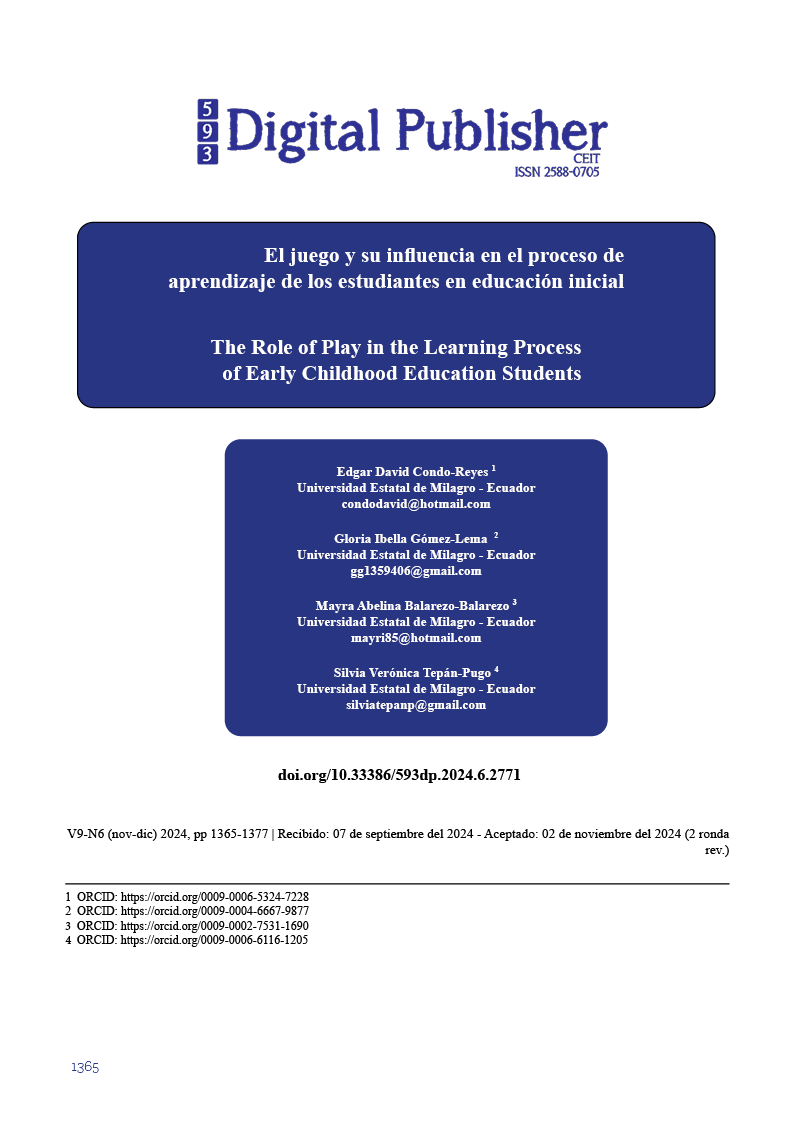The Role of Play in the Learning Process of Early Childhood Education Students
Main Article Content
Abstract
In recent decades, play has been widely recognized as a crucial element in the holistic development of children, especially in early childhood education. Numerous studies have shown that play not only significantly contributes to cognitive development but also strengthens socio-emotional competencies, which are essential for academic success and social adaptation. The objective of this study was to analyze parents' perceptions of the use of play in the learning process of early childhood education students at the Unidad Educativa Provincia de Chimborazo, located in the parish of Pallatanga, Canton Pallatanga, Province of Chimborazo, during the 2024-2025 period. A quantitative approach was employed, utilizing a non-experimental cross-sectional design, surveying 20 parents through a structured questionnaire. Additionally, data were statistically analyzed using SPSS, ensuring representativeness and adherence to ethical standards. The results reveal that parents widely recognize the positive influence of play on children's learning, highlighting its capacity to develop cognitive and emotional skills. However, challenges were identified in implementing inclusive games in the classroom, suggesting the need for careful planning. It is concluded that parents perceive play as an essential educational tool in early childhood education. Nonetheless, the study's limitations, such as sample size and the lack of direct assessment of academic performance, should be considered in future research.
Downloads
Article Details

This work is licensed under a Creative Commons Attribution-NonCommercial-ShareAlike 4.0 International License.
1. Derechos de autor
Las obras que se publican en 593 Digital Publisher CEIT están sujetas a los siguientes términos:
1.1. 593 Digital Publisher CEIT, conserva los derechos patrimoniales (copyright) de las obras publicadas, favorece y permite la reutilización de las mismas bajo la licencia Licencia Creative Commons 4.0 de Reconocimiento-NoComercial-CompartirIgual 4.0, por lo cual se pueden copiar, usar, difundir, transmitir y exponer públicamente, siempre que:
1.1.a. Se cite la autoría y fuente original de su publicación (revista, editorial, URL).
1.1.b. No se usen para fines comerciales u onerosos.
1.1.c. Se mencione la existencia y especificaciones de esta licencia de uso.
References
Aronstam, S., & Braund, M. (2016). Play in Grade R classrooms: Diverse teacher perceptions and practices. South African Journal of Childhood Education, 5(3), 1–10. https://doi.org/10.4102/sajce.v5i3.242
Ashiabi, G. S. (2007). Play in the Preschool Classroom: Its Socioemotional Significance and the Teacher’s Role in Play. Early Childhood Education Journal, 35(2), 199–207. https://doi.org/10.1007/s10643-007-0165-8
Bautista, A., Habib, M., Eng, A., & Bull, R. (2019). Purposeful play during learning centre time: from curriculum to practice. Journal of Curriculum Studies, 51(5), 715–736. https://doi.org/10.1080/00220272.2019.1611928
Boysen, M. S. W., Sørensen, M. C., Jensen, H., Von Seelen, J., & Skovbjerg, H.-M. (2022). Playful learning designs in teacher education and early childhood teacher education: A scoping review. Teaching and Teacher Education, 120, 103884. https://doi.org/10.1016/j.tate.2022.103884
Cowan, N. (2014). Working Memory Underpins Cognitive Development, Learning, and Education. Educational Psychology Review, 26(2), 197–223. https://doi.org/10.1007/s10648-013-9246-y
Diamond, A. (2016). Why improving and assessing executive functions early in life is critical. In Executive function in preschool-age children: Integrating measurement, neurodevelopment, and translational research. (pp. 11–43). American Psychological Association. https://doi.org/10.1037/14797-002
Ferholt, B., & Lecusay, R. (2009). Adult and Child Development in the Zone of Proximal Development: Socratic Dialogue in a Playworld. Mind, Culture, and Activity, 17(1), 59–83. https://doi.org/10.1080/10749030903342246
Hedges, H., & Cullen, J. (2012). Participatory learning theories: a framework for early childhood pedagogy. Early Child Development and Care, 182(7), 921–940. https://doi.org/10.1080/03004430.2011.597504
Hornby, G. (2014). Inclusive Special Education (1st ed.). Springer New York. https://doi.org/10.1007/978-1-4939-1483-8
Ilgaz, H., Hassinger-Das, B., Hirsh-Pasek, K., & Golinkoff, R. M. (2018). Making the Case for Playful Learning. In International Handbook of Early Childhood Education (pp. 1245–1263). https://doi.org/10.1007/978-94-024-0927-7_64
Kaluba, C., Kalinde, B., fMambwe, R., Sichula, N., & Njobvu, N. (2024). Exploring Early Childhood Education Teachers’ Play-Based Learning Pedagogical Practices in Zambia. Journal of Law and Social Sciences, 5(4), 21–42. https://doi.org/10.53974/unza.jlss.5.4.1163
Ke, F., Xie, K., & Xie, Y. (2016). Game‐based learning engagement: A theory‐ and data‐driven exploration. British Journal of Educational Technology, 47(6), 1183–1201. https://doi.org/10.1111/bjet.12314
Kennedy, T. J., & Tunnicliffe, S. D. (2022). Introduction: The Role of Play and STEM in the Early Years. In Play and STEM Education in the Early Years (pp. 3–37). Springer International Publishing. https://doi.org/10.1007/978-3-030-99830-1_1
Lestari, E. T., & Bahri, S. (2024). Implementation of Ethnopedagogy Through Tabak Educative Traditional Games for Multicultural Value Reinforcement. AL-ISHLAH: Jurnal Pendidikan, 16(2), 1061–1070. https://doi.org/10.35445/alishlah.v16i2.4332
Lillard, A. S., Lerner, M. D., Hopkins, E. J., Dore, R. A., Smith, E. D., & Palmquist, C. M. (2013). The impact of pretend play on children’s development: A review of the evidence. Psychological Bulletin, 139(1), 1–34. https://doi.org/10.1037/a0029321
Lu, G., Xie, K., & Liu, Q. (2022). What influences student situational engagement in smart classrooms: Perception of the learning environment and students’ motivation. British Journal of Educational Technology, 53(6), 1665–1687. https://doi.org/10.1111/bjet.13204
Murray, J. (2018). Early Childhood Pedagogies (J. Murray, Ed.). Routledge. https://doi.org/10.4324/9781315473536
Nicolopoulou, A. (1993). Play, Cognitive Development, and the Social World: Piaget, Vygotsky, and Beyond. Human Development, 36(1), 1–23. https://doi.org/10.1159/000277285
Pellegrini, A. D., & Smith, P. K. (1998). Physical Activity Play: The Nature and Function of a Neglected Aspect of Play. Child Development, 69(3), 577–598. https://doi.org/10.1111/j.1467-8624.1998.tb06226.x
Pramling Samuelsson, I., & Johansson, E. (2006). Play and learning—inseparable dimensions in preschool practice. Early Child Development and Care, 176(1), 47–65. https://doi.org/10.1080/0300443042000302654
Ramey, C. T., & Ramey, S. L. (2004). Early Learning and School Readiness: Can Early Intervention Make a Difference? Merrill-Palmer Quarterly, 50(4), 471–491. https://doi.org/10.1353/mpq.2004.0034
Reyes, M. R., Brackett, M. A., Rivers, S. E., White, M., & Salovey, P. (2012). Classroom emotional climate, student engagement, and academic achievement. Journal of Educational Psychology, 104(3), 700–712. https://doi.org/10.1037/a0027268
Richter, L. M., Daelmans, B., Lombardi, J., Heymann, J., Boo, F. L., Behrman, J. R., Lu, C., Lucas, J. E., Perez-Escamilla, R., Dua, T., Bhutta, Z. A., Stenberg, K., Gertler, P., & Darmstadt, G. L. (2017). Investing in the foundation of sustainable development: pathways to scale up for early childhood development. The Lancet, 389(10064), 103–118. https://doi.org/10.1016/S0140-6736(16)31698-1
Shemshack, A., Kinshuk, & Spector, J. M. (2021). A comprehensive analysis of personalized learning components. Journal of Computers in Education, 8(4), 485–503. https://doi.org/10.1007/s40692-021-00188-7
Shernoff, D. J. (2013). Optimal Learning Environments to Promote Student Engagement (1st ed.). Springer New York. https://doi.org/10.1007/978-1-4614-7089-2
Srinivasan, R. (2023). Play for All: Fostering Inclusive Play Spaces in India. In Childhoods & Leisure (pp. 57–79). Springer International Publishing. https://doi.org/10.1007/978-3-031-33789-5_3
Sturm, D., Kholodovsky, M., Arab, R., Smith, D. S., Asanov, P., & Gillespie-Lynch, K. (2019). Participatory Design of a Hybrid Kinect Game to Promote Collaboration between Autistic Players and Their Peers. International Journal of Human–Computer Interaction, 35(8), 706–723. https://doi.org/10.1080/10447318.2018.1550180
Sulistyaningtyas, R. E., & Fauziah, P. Y. (2019). The Implementation of Traditional Games for Early Childhood Education. Proceedings of the 3rd International Conference on Current Issues in Education (ICCIE 2018). https://doi.org/10.2991/iccie-18.2019.75
Vlachopoulos, D., & Makri, A. (2017). The effect of games and simulations on higher education: a systematic literature review. International Journal of Educational Technology in Higher Education, 14(1), 22. https://doi.org/10.1186/s41239-017-0062-1
Walker, G., & Venker Weidenbenner, J. (2019). Social and Emotional Learning in the age of virtual play: technology, empathy, and learning. Journal of Research in Innovative Teaching & Learning, 12(2), 116–132. https://doi.org/10.1108/JRIT-03-2019-0046
Wieder, S. (2017). The Power of Symbolic Play in Emotional Development Through the DIR Lens. Topics in Language Disorders, 37(3), 259–281. https://doi.org/10.1097/TLD.0000000000000126
Zosh, J. M., Hirsh-Pasek, K., Golinkoff, R. M., & A. Dore, R. (2017). Where Learning Meets Creativity: The Promise of Guided Play. In Creative Contradictions in Education (pp. 165–180). https://doi.org/10.1007/978-3-319-21924-0_10
Zosh, J. M., Hirsh-Pasek, K., Hopkins, E. J., Jensen, H., Liu, C., Neale, D., Solis, S. L., & Whitebread, D. (2018). Accessing the Inaccessible: Redefining Play as a Spectrum. Frontiers in Psychology, 9. https://doi.org/10.3389/fpsyg.2018.01124





